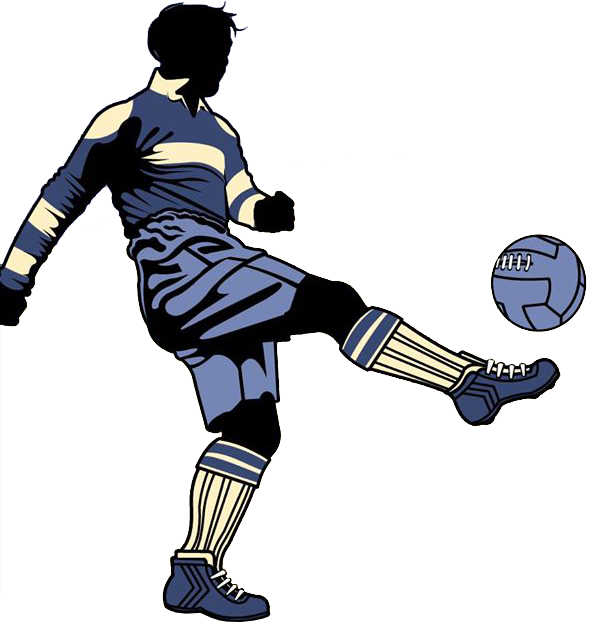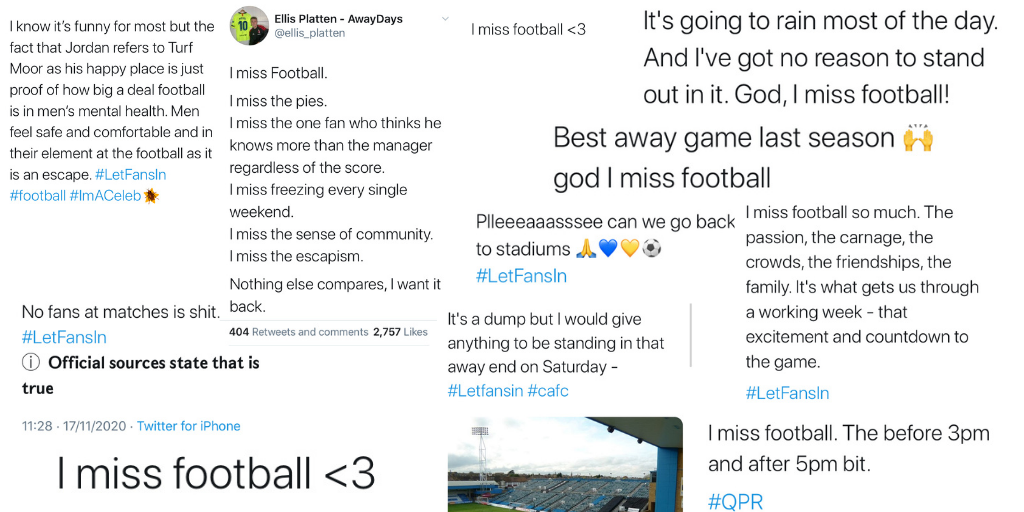Whether it’s league or non-league, local and National lockdowns have been causing us to mourn our beloved football. But what have we be missing? What does it give us? And why can’t we wait to go back?
This is how Ellis Platten from Away Days describes the void.

But how would psychologists explain what we’re missing?
Firstly, and so pertinent to the lockdown days of 2020, there are the social interactions we may be lacking.
Ellis talks passionately about the congregation, the chat, the debate, the community.

When we meet on the terraces we are engaging in an intense social experience with those we connect with and with whom we share the same goals (no pun intended).
This social cohesion has protective qualities which can improve our mental health and when it is missing the opposite is true.
When we support our team we become part of a very special group. What social psychologists like to call an in-group.
Our in-group gives us, as individuals, a sense of ‘we-ness’ and community. It can drive some wonderfully prosocial and empathetic behaviours such as supporters collectively acting to save struggling clubs and football fan food banks like The MUFC + MCFC Fans Supporting Foodbanks project which has raised a massive £27,000 since lockdown began.

As human beings we are born to be social and football gives us the opportunity to connect; an opportunity many of us may not feel able to do elsewhere.
Perhaps it is no coincidence that the ground where we love to watch our team is called ‘home’. It is the place where we feel attached, the place where important relationships are formed, where we feel a sense of rootedness, where lives are lived and shaped, where season ticket neighbours become friends.

The fact that we find social connectedness in football is supported by the findings of a 2014 worldwide survey of 21,000 people from 15 countries including Brazil, Germany and the UK.
They found that social bonding and deepening relationships with other fans were both consistently rated far higher than the entertainment value of the game.
The researchers also found that passionate fans talked of their engagement through immersion - losing themselves in the emotion of the game - twice as much as they mentioned entertainment value.
The ‘community’ and ‘escapism’ that Ellis and others talk of is all too evident from this research.
Importantly there’s a physical element to what we’re missing too - we get a rush from football - as Callum from the Football CFB podcast explains
“The thrill of a Saturday is more than just watching a game of football. It’s meeting up with friends, going on supporters buses and the smell of the food vendors as you approach the stadium. Buying the match programme, settling into your seat and hearing that rush of noise as your team emerge looking for an ever important three points. That is Saturday 3pm.
That is why we love football and that is what we as football fanatics desperately need back in the routine of our lives.”
A 2019, University of Leeds study by Dr Andrea Utley backs up Callum’s description of ‘the thrill’, finding that there are actually many physical benefits to watching a game of football.

The research followed 25 Leeds fans during the last few weeks of a climactic season.
Participants’ heart rates, blood pressure and mood were all measured during three key games in the promotion race.
The average increase in heart rate when at a match was 17% which jumped up to 29% for the home play-off game against Derby and blood pressure spiked just before kick-off and again at half-time.
These matches actually gave the supporters a cardiovascular workout - similar in physical effect to taking a good walk - and they found that a win could give an elation lasting up to a day.
Elder and his colleagues found very similar effects with Scottish fans back in 1991.
So, as well as the connection and community it brings, going to matches makes our heart race. No wonder we miss it! We get a buzz from football which, for many, just can not be replicated.
Shirt Lane describes the excitement of the proceedings surrounding a game...
“A match day for me is exactly that, a day. You get up, you're excited, you plan your day around it. What time to leave, where to park, do I go for a drink, food etc.
Then there's the whole discussion about the lineup, opposition line-up. The game itself, the atmosphere, the feel, criticising the officials, players and everything to go with being there, feeling it. Post match chat, what went wrong, who played well, having to warm-up, do I have a pint. It's an event”
I too miss the occasion a football match brings. As a family we are a unit, striped scarves at our necks, we share the next few hours together, come what may.
The shoulder to shoulder walk to the stadium. Mike Oldfield channelled through tinny speakers, urging your clapping participation with every step through the stands.
The surge in chatter, the anticipation. The exhilaration, the cold, the kids scrambling to find a free programme at the end, standing in an empty stadium when everyone else has long since left their seats.
I miss the weekends of grassroots too; getting up early to drive one child or the other to a match, getting drenched watching them train, even clearing up those insidious, 3G pitch, black remnants that get traipsed through the house.
Our family needs football.

The good news is that, after a long wait, supporters will soon be back in their ‘home’ and grass roots participation will resume, but in the meantime, don’t forget to forge those connections in other ways; preserve your own mental health by reaching out to your football community and check in on those you might usually share a game and a chat with.

When we say 'we miss the football', we are missing more than the game itself. It’s the affiliation, commonality, kinship, identification and so very, very much more.
References & further information
Elder, A. T., Jyothinagaram, S. G., Padfield, P. L. & Shaw T. R. (1991) Haemodynamic response in soccer spectators: is Scottish football exciting? British Medical Journal. Dec 21-28;303(6817):1609-10
Seppälä, E. The Happiness Track (2016) HarperOne
You can read about the Leeds fans study in more detail here https://blog.betvictor.com/campaigns/your-body-on-football/
Havas Sports & Entertainment Global Sports Study
https://www.lbbonline.com/news/havas-sports-entertainement-decodes-global-sports-fans




